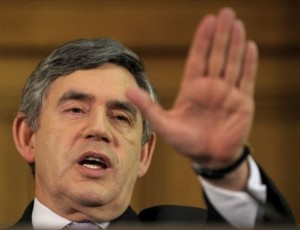British etiquette dictates that “you may not shake the queen’s hand, only touch it briefly,” so that would rule out the fist bump. And if there’s food around, and the queen stops eating it, everybody else has to stop, too.
BY Kenneth R. Bazinet and Richard Sisk
 WASHINGTON – “Just be yourself” was the advice from the palace for the big meet with Queen Elizabeth, but First Lady Michelle Obama was taking no chances Tuesday.
WASHINGTON – “Just be yourself” was the advice from the palace for the big meet with Queen Elizabeth, but First Lady Michelle Obama was taking no chances Tuesday.
The usual spies said that White House and State Department protocol types had briefed the First Lady on the do’s and don’ts of royal chitchat and such, and she had passed it on to President Obama aboard Air Force One.
For the Buckingham Palace grip-and-greet Wednesday, British etiquette dictates that “you may not shake the queen’s hand, only touch it briefly,” so that would rule out the fist bump. And if there’s food around, and the queen stops eating it, everybody else has to stop, too. Among the big don’ts – don’t act like former Presidents George W. Bush and Bill Clinton. Her Royal Highness was not amused when Bush winked at her in 2007 after muffing his lines to suggest that Elizabeth may have been around in 1776.
Then there was the time in the ’90s when Clinton tried to bring a group of hangers-on with him into the palace.
When they were barred, Clinton aides complained that the queen’s attendants had been allowed into the White House earlier. One of the queen’s staff shot back: “Yes, well, this is the palace, isn’t it?”
Not that any of this will ruffle the queen, who has taken the measure of 11 Presidents going back to the administration of Harry S Truman, when she was a mere princess. The only President she hasn’t met since then is Lyndon B. Johnson.
The White House has kept a tight lid on the gifts for the queen the Obamas will bring Wednesday night, saying only that they will be an upgrade from the classic-movie DVDs Obama recently gave Prime Minister Gordon Brown.
The British have leaked that the queen will have something in the way of Harris Tweeds for the Obamas.
The White House was also mum on whether Michelle Obama will go with sleeves or be sleeveless in the manner that has wowed the style mavens of late.
Carl Anthony, a historian at the National First Ladies Museum, can’t understand the fuss about the sleeves. “Michelle Obama seems to favor a once-popular style,” said Anthony, noting that Nancy Reagan, Mamie Eisenhower, Bess Truman and other First Ladies going back to Dolly Madison sometimes ditched the sleeves. The new First Lady “is not some kind of history heretic here,” Anthony said. Obama and the other world leaders attending the G-20 summit will also attend a reception at the palace and then move on to the prime minister’s residence for a dinner hosted by Brown.




 London’s beleaguered bankers can lead the world to future prosperity by embracing reforms being unveiled at the G20 summit, Gordon Brown declared today.
London’s beleaguered bankers can lead the world to future prosperity by embracing reforms being unveiled at the G20 summit, Gordon Brown declared today.